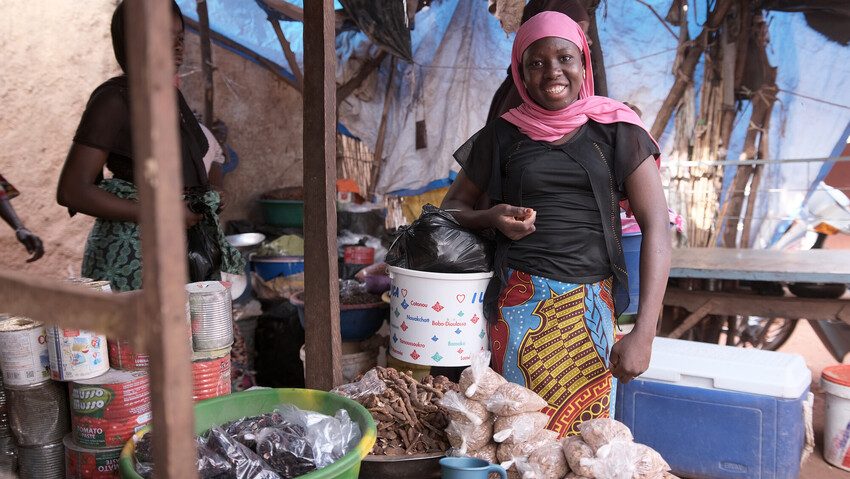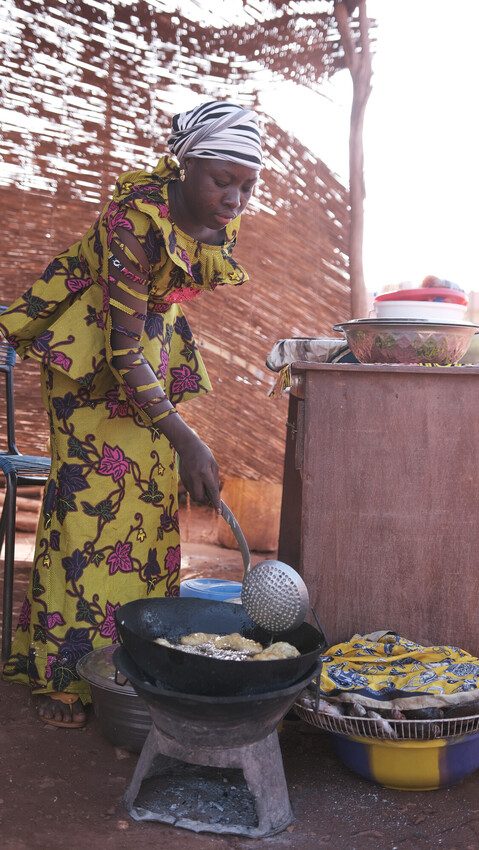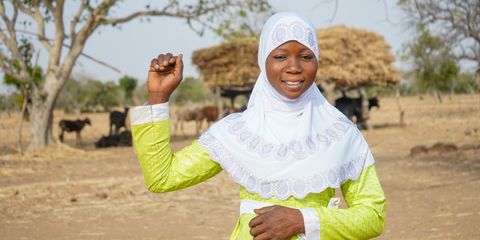Cash helps girls rebuild their lives
15 June 2023Plan International has scaled up its cash and voucher assistance programming to respond to the growing hunger crisis. Why? Because it works. Learn more about this element of our humanitarian strategy in this blog by Syed Mohammed Aftab Alam, Global Cash and Vouchers Specialist and Emilio Paz, Deployable Cash and Markets in Emergencies Specialist.
Eighteen-year-old Aïssata was forced to flee her home due to growing conflict in Mali.

“It was the war that forced us to come here. We brought nothing with us. We left everything behind.”
Cash and voucher assistance (CVA) from Plan International is helping her get back on her feet as she has used cash transfers to set up a street food business, the profits giving her a sustainable income.
Plan International has scaled up its cash and voucher assistance programming, injecting €8.4 million into this type of assistance. Why? Because it works, for Aïssata and girls like her.
Cash is a cost effective way to meet peoples’ needs
Cash transfer is one of the most effective ways to support people during a crisis. Evidence has shown that in the right circumstances, giving people cash is a superior, more cost-effective way to meet their needs than other forms of assistance.
For example, during COVID-19 in the United States and India, ‘stimulus cheques’ were used to support those who could no longer work due to lockdowns to support themselves, and to keep the economy moving.
And evidence from many past emergencies show that cash transfers help to maintain access to healthcare, protect consumption, support protection and recovery of livelihoods and sustain investments in human capital – just like Aïssata has done with her small business.
One of the strongest and most consistent findings regarding cash transfer programmes is their contribution to reducing hunger.
Cash provides choice, autonomy and dignity

Recipients can choose what they spend their money on – be it food, household items or school fees, giving them choice, autonomy and dignity. Multi-purpose or unconditional cash assistance offers maximum flexibility to meet peoples’ diverse needs during emergencies, as quickly as possible.
The estimated reach for our current CVA programming is 115,209 people. We’ve supported girls, young women and families this way in over 50 countries, most recently focusing on hunger hotspots such as Mali, Niger, Ethiopia, Burkina Faso, Somalia, Haiti, South Sudan and Kenya.
Despite this success, humanitarian organisations have been slow to adopt CVA as a method of assistance. Common misconceptions are that cash may be misused, lead to corruption, or make recipients unsafe. However, studies suggest that only around 2% of CVA is used against its intended purpose, suggesting that concerns that cash transfers may be used for alcohol and tobacco are unfounded.
Provisions of ‘traditional’ forms of assistance like food, blankets, shelter etc. may be lost, stolen, or even sold by recipients to meet other needs. There are also logistical issues with these forms of assistance. Items have to be stored, and moving the supply from the suppliers over distances can be a challenge – especially if trying to get them to remote communities where transportation is difficult.
CVA has increased in popularity within humanitarian organisations only in the last 15 years as its benefits are slowly being recognised.
Cash assistance helps people recover after crises
CVA plays an important role to help communities recover from the impact of disasters brought about by climate change, natural hazards, economic shocks, conflict, and protracted crises. It is an effective tool to achieve desired outcomes in education, protection, food security, and gender in emergencies.
Plan International has a commitment to increase the use of cash in its emergency response as part of our revised strategy published this year, which is why we ask the question “Why not cash?” first as a preferred modality whenever appropriate.
Cash transfers allow autonomy and build young women’s economic empowerment. As Aïssata says. “Today I am happy because my business has developed…. Through this business, I earn my living. My ambition is to open a restaurant.”


